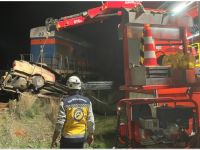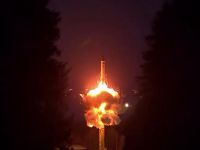Israeli authorities handed over the body of a Palestinian teenager to the Palestinian civil affairs department on Saturday evening.
Thirteen-year-old Ruqayya Eid Abu Eid, originally from the village of Yatta south of Hebron, was shot dead earlier on Saturday by an Israeli security guard after allegedly trying to stab him near the illegal settlement of Anatot.
Her body was taken to al-Ahli hospital in Hebron, after being received by her family.
Palestinian Public Prosecutor Alaa al-Tamimi said that "the necessary medical and legal procedures will be taken to document the Israeli crime."
The reported attack outside of Anatot is the most recent to take place amid an ongoing wave of unrest in the occupied Palestinian territory.
Last week a 15-year-old Palestinian, also from Yatta, was detained for being suspected of stabbing and killing an Israeli settler in the illegal settlement of Otneil, one day before another settler was stabbed and injured by a Palestinian in the illegal settlement of Tekoa.
The death of the 36-year-old mother in the Otneil settlement brought condemnation from Israeli leadership and UN officials, who called on Palestinian and Israeli leadership to stop incitement.
Over 20 Israelis have been killed in attacks carried out by Palestinian individuals since Oct. 1. More than 160 Palestinians have been killed by Israeli military forces or settlers in the same time period, at least 30 of whom were under the age of 18.
Israeli authorities began holding the bodies of Palestinians killed while carrying out attacks on Israeli military or civilians in October. The practice has not been used with such frequency since the Second Intifada, according to rights group Hamoked.
However, Israel's withholding of bodies has only further stoked tensions in the occupied Palestinian territory, and Israeli authorities have since returned many of them of them to their families, on what they refer to as a "case-by-case" basis.
Israeli authorities have implemented a number of restrictions on Palestinian communities in the West Bank since violence increased in October, including road closures, sealing off movement in and out of villages and towns, and arrest campaigns.
The area around Hebron has been particularly affected by these measures, leading to further resentment from Palestinians.
Israeli army Chief of Staff Gadi Eisenkot said Monday that “it would be a bitter mistake to impose curfews and closures” on Palestinian communities, adding that such moves would “work against Israeli interests.”
While “security measures” have been eased over the past month according to documentation by the UN Office for the Coordination of Humanitarian Affairs, many closures and restrictions on movement remain in place, particularly in the Hebron district.
ALBAWABA - A police helicopter crashed on Wednesday night in the Flagstaff area in Arizona state in the United States, the Page Police Department posted online. A video was shared ...










